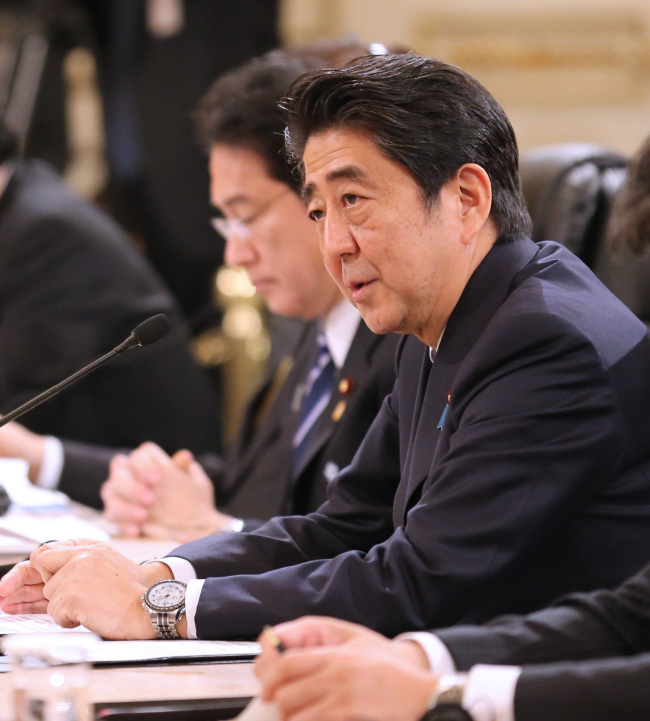Japanese Prime Minister Shinzo Abe on Monday called a snap election, seeking a fresh term at the helm of the world's third-largest economy as tensions with nearby North Korea reach fever-pitch.
Abe hopes to capitalise on a weak and fractured opposition to sweep back into power, as polls show him regaining ground after a series of scandals.
"I will dissolve the House of Representatives on the 28th" of September, Abe told reporters, a precursor to a general election. The prime minister did not give a date for the vote but it is widely expected to be October 22.
Surveys suggest voters approve of nationalist Abe's hardline stance on North Korea, which fired two missiles over the country in the space of a month and has threatened to "sink" Japan.
"The election, which is the core of democracy, should not be influenced by the threats of North Korea," stressed Abe, 63.
"Rather, by holding an election, I want to seek a public mandate regarding (the government's) handling of the North Korean issues," he added.
 |
Japanese Prime Minister Shinzo Abe. (Yonhap) |
- 'Difficult time' -
According to a weekend poll in business daily Nikkei, 44 percent of Japanese plan to vote for Abe's conservative Liberal Democratic Party (LDP), while only eight percent favoured the main opposition Democratic Party.
Nevertheless, one fifth of those polled said they were still undecided, potentially opening the door for gains by a new party formed by the popular mayor of Tokyo Yuriko Koike which will field dozens of candidates.
Koike's Tomin First no Kai (Tokyo Residents First) party humiliated Abe and the LDP in local elections in July, but analysts say the new grouping has not had time to lay a national foundation to mount a serious challenge to the prime minister.
In an apparent bid to steal Abe's limelight, former TV anchorwoman Koike went before the cameras just hours before his news conference to announce she was creating a national political party called "Kibo no To" (Party of Hope).
"Japan is facing a difficult time considering the situation in North Korea.
Economically, the world is making a big move while Japan's presence is gradually declining," said Koike.
"Can we continue letting (the existing lawmakers) handle politics?"
But Jeff Kingston, director of Asian Studies at Temple University in Japan, said there was "no opposition worthy of the name in Japan".
"The LDP is a giant among dwarves. It would take a major scandal to derail the Abe express," he said.
- 'Political vacuum' -
The winner of the expected snap election faces a daunting in-tray of challenges ranging from an unprecedented crisis with North Korea to reviving the once world-beating Japanese economy.
The North Korea crisis appears to have given the hawkish Abe a welcome boost in the polls following a series of scandals, including allegations he improperly favoured a friend in a business deal.
Despite a recent run of growth, the election winner will also have to contend with a sluggish economy, as the heavily indebted country grapples with a low birth rate and a shrinking labour force.
Abe said Japan's "biggest problem" was a declining number of children in an ageing society.
He pledged to use some of the proceeds of a planned hike in sales tax to fund education and childcare, rather than drawing down Japan's massive debt, resulting in an effective stimulus package of around two trillion yen ($18 billion).
"I want people's support. I plan to compile a new economic package by the end of the year," the prime minister said.
Although Abe is expected to triumph in the vote, there are question marks over whether he will retain the two-thirds parliamentary majority needed to reform the constitution to strengthen Japan's military, one of his stated priorities.
"Despite the seemingly favourable backdrop for Abe, there are risks in calling a snap election," said Yoel Sano, an analyst at BMI research.
At a time of national crisis over North Korea, Japanese voters may see it as a "cynical and opportunistic move" designed to divert attention from the scandals that weighed on Abe's popularity, warned Sano.
Commentator Masao Yora said the election would "create a political vacuum"
just when the country needs strong leadership in the face of the threat from Pyongyang.
This "may seem normal in Japan but from abroad, it is difficult to understand", Yora told AFP.
If re-elected, it would be Abe's fourth term.
Abe, the third generation of a powerful political family, appeared to be groomed for power from an early age. He was the country's youngest prime minister when he first won the top job aged 52.
Abe was the first world leader to cultivate close relations with US President Donald Trump, meeting the tycoon in Trump Tower even before he was inaugurated. (AFP)








![[Today’s K-pop] Blackpink’s Jennie, Lisa invited to Coachella as solo acts](http://res.heraldm.com/phpwas/restmb_idxmake.php?idx=644&simg=/content/image/2024/11/21/20241121050099_0.jpg)